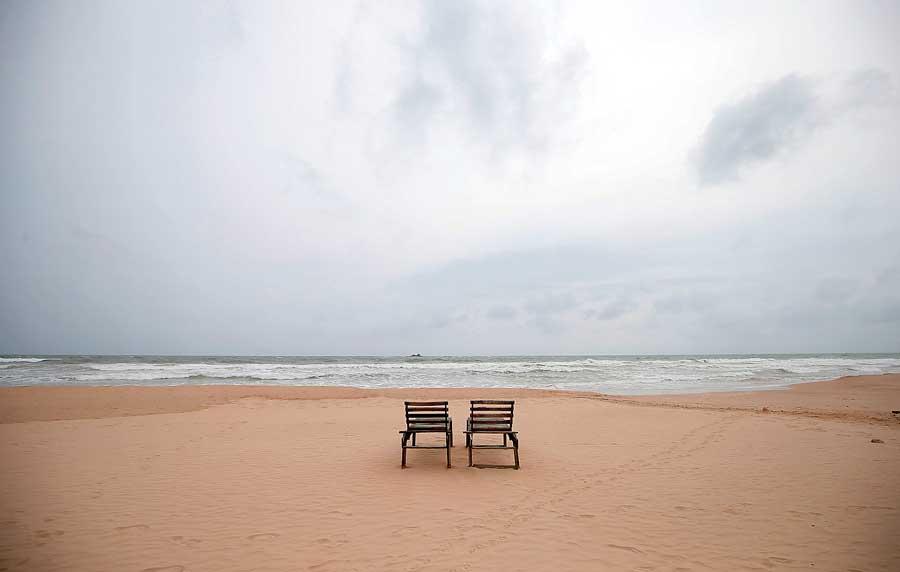11 Jun 2019 - {{hitsCtrl.values.hits}}

Empty sunbathing chairs are seen on the beach near tourist hotels in Bentota (Reuters photo)
 Sri Lanka tourism is currently going through a major crisis as a result of the devastation of the Easter 2019 terrorist attacks.
Sri Lanka tourism is currently going through a major crisis as a result of the devastation of the Easter 2019 terrorist attacks.
Occupancies are at rock bottom levels and staff is being laid off and some hotels are partially closed down. However in this environment of ‘doom and gloom’, a proper crisis management plan has to be implemented to tide over the rough times being experienced.
In addition there are also opportunities to be availed off. Hotels should seize this opportunity to re tool, upgrade service standards, streamline operations for greater productivity and be prepared to relaunch themselves as more leaner efficient and customer focused organizations once the
turnaround arrives
There is no doubt that the terrible events that unfolded on Easter Sunday on 21st May 2019 were unprecedented in Sri Lanka, and possibly even in the South East Asian region, where some 250 innocent civilians lost their lives, leaving another 500 or more injured. With the ensuing travel advisories imposed by some 20 plus countries against travel to Sri Lanka, the Tourism industry is currently devastated, with island wide foreign occupancy being about 10-12 percent.
(At the time of writing several travel advisories have been relaxed, and there is a sense of euphoria amongst the tourism trade. However this will not just ‘open the flood gates’ for tourists. Carefully planned, source market specific, PR/Communication campaigns must be launched. A shot gun’, one size fits all campaign will not be effective)
The local tourism industry has very been resilient withstanding and weathering a over 25-year long internal civil strife, 9/11, SARS, Bird flu and Tsunamis. However, it appears that this crisis is the ‘mother of all crises’. Hotels are virtually empty and hundreds of casual staff has been laid off. Even existing permanent staff are given compulsory leave and sent home. Service charge has plummeted down, and staff, who are generally used to having their service charge augment their monthly salaries, now find themselves in dire financial trouble, not being able to make both ends meet.
Many hotels are battling with serious cash flow issues, although the government relief package announced may bring in some respite. All this creates an environment of doom and gloom, with motivation levels hitting rock bottom.
In responding to this crisis firstly one has to come to terms with the calamity, and respond to the immediate need and then only manage the crisis response properly
It would also be worthwhile to take some time and assess whether it is really all ‘doom and gloom’? Are there any opportunities to be found amidst this desolation? Many learned men have said that there are opportunities to be found in every difficult situation. So there are many initiatives that can be taken at grass root operations level.
1.0 Managing the response to the crisis
1.1 Crisis Management team
1.2 Public Relations
Usually all PR and communication activities are left to the Tourism authorities during a crisis. However there is much PR that can be done at operational level individually to help the recovery process.
you communicate
1.3 Cash flow
1.4 Staff
so communicating with them is also important.
of uniforms
1.5 Housekeeping & Maintenance
Expenditure in these areas is the easiest to slash, sometimes at a great cost in the long term. So the focus should be on careful ‘cost management’ rather than ‘cost cutting’
2.0 Seeking out the opportunities
2.1 Train and upskill staff
During normal operational times it is well known fact that staff training of a formal nature takes a back seat. With busy operations going on,
most hotels depend on informal on-the-job training with very little corrective supervision.
It is also known that Sri Lanka tourism is slowly losing its edge in customer care. Warm welcoming smiles and professional and friendly service is deteriorating in Sri Lanka tourism, and what better time than a downtime during a crisis such as this, to address this issue.
2.2 Major outstanding maintenance /upgrading work
In any hotel operations there a number of engineering projects both new and upgrades, which tend to get postponed due to normal day-day operational pressures. Sometimes these projects get postponed due to the disturbance that it may cause guests and the inability to shut down rooms. Thereforeat a time like this some of these projects can
be implemented.
2.3 Review all systems and procedures
During busy times with need for controls. many procedures and systems are introduced along the way, as and when issues arise in day –to-day operations. All these add up over time and cause bottlenecks and bureaucracy, sometimes impeding good customer service
and productivity.
2.4 Review operational overheads
Similar to systems and procedures that accumulate overtime, not much time is spent on studying analysing operating margins on various activities in operations. A down time such as this crisis provides the ideal opportunity to review past operations and trimming operational overheads.
2.5 Focus on sustainability
Sustainable tourism development is the future direction of tourism the world over. Being a country blessed with a range of natural beauty, Sri Lanka tourism has therefore to be focused on following good sustainable consumption practices (SCP). Downtime during a crisis affords an opportunity to work on this area
3.0 Conclusion
It is thus clear that a downtime in a crisis frees up time of key operational staff to focus inwards and to review operational efficiency, which otherwise gets neglected in the day to day hustle and bustle of the service industry.
Hence all hotels should take this opportunity to focus on these aspects and streamline their operations, so that when the turnaround arrives, the organization will be a leaner, more customer focused, competitive and efficient outfit.
10 Jan 2025 1 hours ago
10 Jan 2025 1 hours ago
10 Jan 2025 3 hours ago
10 Jan 2025 3 hours ago
10 Jan 2025 3 hours ago